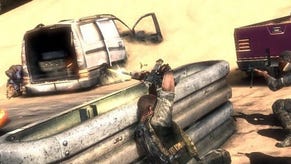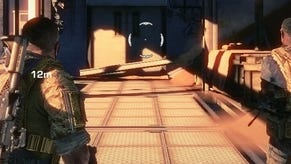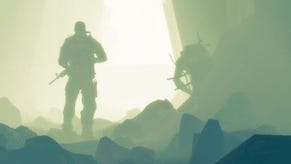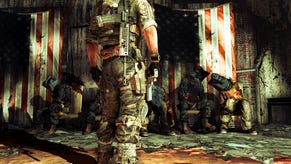Spec Ops: The Line Preview
Dubai to all that.
Mounted high on the gleaming silver superstructure of one of Dubai's improbable skyscrapers is a vast advertising hoarding filled with a model's pouting lips. In the bottom left corner of the huge banner, someone has used bright red paint to scrawl a single word: Help.
It's disquieting stuff, even when glimpsed from the relative safety of a military helicopter as you pass low over the city, but - listen to that voice - at least you've got good old Nolan North to keep you safe. Or have you? Minutes into Spec Ops: The Line, it's clear that this is a story that cuts a little deeper than the likes of Uncharted, and if that's Nathan Drake we're playing as, it's a Nathan Drake who's recently spent a really long time thinking about all those people he's killed.
It's not Nathan Drake at all, of course. The Line's hero is a Delta Force soldier named Captain Martin Walker, and he and his two squad-mates have touched down in a ravaged near-future Dubai to track down Colonel Konrad, a military officer with a near-perfect track record. He's also been presumed dead for the last six months, caught up in a failed evacuation as freak sandstorms steadily picked the world's strangest city apart. Over the last few days, evidence has started to emerge suggesting that he might still be alive.
Even before you've let the desert sweep in and blow the town to hell, Dubai's a great place to set a shooter that aims to peek into the heart of darkness. It's glitzy and gaudy in a rather unpleasant kind of way, like Las Vegas, another sun-blasted metropolis with no real reason to exist. Torn apart by natural forces, however - half-buried under shifting dunes, its elegant towers toppled or split apart - it's almost like going to Rapture for the first time. What a surreal and horrifying place: highways littered with empty luxury cars and a huge tourist's coach haemorrhaging pricey luggage, crashed jet-liner interiors where drinks trolleys poke out of the sandy gloom, a lone sun-lounger and tattered umbrella set against a horizon of brooding sand.
The adventure begins on that highway, as it happens, and it's a fitting starting point for a game that is designed to be essentially linear. Spec Ops' combat offers tactical freedom within pleasantly tight confines - in the canyon between skyscrapers, say, or strung through the lobby of a shattered hotel complex - while the game's moments of choice don't give you control over where the plot goes so much as how deeply you want it to explore the ambiguities of conflict. Which prisoner do you choose to execute in a madman's kangaroo court? Is war bad, or is it bad and then some?
Considering it's been in development for quite some time - and out of the public eye since a brief, confusing showing at E3 a few years back - Spec Ops is admirably focused: a scarlet ribbon of narrative tying together short, punchy cover-based combat set-pieces as you venture deeper into the city, ostensibly to find and rescue Konrad, but also just to find out what he's actually been up to while MIA.
It's going to be a lovely shooter, I suspect: guns rattle hungrily through shallow clips as you take on heavily-armed looters and roving gangs, and enemies expire dramatically in blasts of red mist. The assault rifle is filled with chewy character, while the shotgun takes people's legs right out from under them in a single blast if you're close enough. Gears may be the obvious reference point as you move from one chunk of cover to the next, sliding into place with a satisfying sense of weight that so many other imitators completely forget to include, but there's a fair amount of Halo, too - in the two weapon slots, and in the simple, but clearly differentiated arsenal that helps to define each battle.
Hard as it is to judge from playing an hour or two of the campaign, enemy AI seems a little smarter than usual too - Yager Development, the team behind Spec Ops, suggests it has even had to enlarge its combat arenas to give your attackers sufficiently interesting options to choose between as they fight against you. The best encounters provide both you and your foes with an obvious objective, and if you rely on suppression tactics too much, individual AIs will lose it and simply run at you with knives drawn. Exterminate all the brutes.
Friendly AI isn't bad either, with your two squad mates capable of picking their own fights - although they can, at times, seem a little ineffective - or submitting to your orders and taking down the targets that you can prioritise with a press of the right bumper. On normal settings, they take a good few clips before bleeding out in most circumstances. You can revive them with a button press, but they're not immortal. Lose them in a fight and it's game over.
Yager's getting the most from the environment, too, gently rebalancing each encounter you come across, from all-out warfare on the streets, to cautious three-against-three room-clearing as you head indoors. A few stand out sections see you snapping on silencers and stealthing your way as far as you can. The sand, meanwhile, is both friend and foe. When it's piled up on weak surfaces, you can often shoot out glass or supporting plywood, causing it to swamp masses of enemies in a single, horrifying landslide, or you - and your enemies - can lob grenades into it to kick up debilitating dust clouds.
Things get really interesting during the storms that rip through town on occasion, the desert staining the sky red and turning enemies into shadows. It's heavily-scripted, but it works with the AI to create some great moments - and provide some unusual tactical choices. Pinned-down by distant enemies with only a shotgun left to rely on, I found it best to actually run straight into a storm when it whipped up. I lost control of my squad as a result of it, but the enemy was suddenly as blind as I was, and I could stumble closer to them and pick them off one at a time.
In case the whole story structure and a rather heavy-handed character reference aren't ringing any GCSE English bells, Spec Ops is heavily inspired by Joseph Conrad's wonderfully horrible novella Heart of Darkness. It's a book that pokes restlessly at modern man's capacity for primitive cruelty before concluding that, cor, we're a right lot of sad troublemakers, aren't we?
Yager's captured the descent into a claustrophobic and highly personal hell extremely well in its decimated metropolis. The team also manages to retain Conrad's fondness for the jarring, if rather glib, surrealism that can be found whenever the civilised world rubs up against violence - even if he never had to resort to a gunfight fought by soldiers cowering behind rowing machines. Interestingly, your two squad-mates aren't just there to shoot that annoying jerk on the second floor of the building opposite, but to hold a mirror up to Walker as each of your decisions. Whether it's dealing with an encounter or choosing whether to execute a dying foe, each decision leads you a little closer towards crossing that ambiguous line where a soldier becomes a criminal.
It's not the kind of stuff you often have to consider in your average third-person shooter. That said, despite the cover, the endless combat, and the presence of Nolan North, there's a genuine chance that Spec Ops may turn out to be anything but average.









